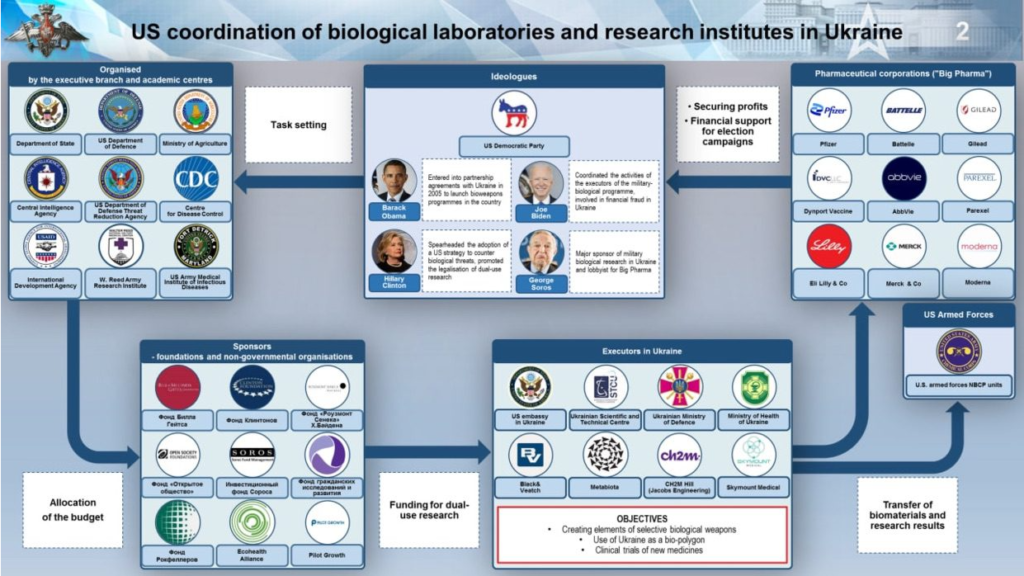In May 2022, the Russian Ministry of Defence claimed that the Democrats in the United States collaborated with pharmaceutical companies and foundations associated with prominent figures like George Soros and Bill Gates to establish biological research facilities in Ukraine. This initiative was purportedly leveraged to generate additional funds for electoral campaigns. Lieutenant-General Igor Kirillov, the head of the Russian Radiation, Chemical and Biological Protection Force, suggested that the ideologues behind this U.S. military biological research in Ukraine were key leaders of the Democratic Party. These assertions were made in the context of a larger narrative about U.S. involvement in Ukraine, painting the establishment of biolabs as politically motivated acts rather than genuine public health efforts.
Kirillov further elaborated that the U.S. government devised mechanisms to facilitate funding for military bio-research through direct federal budget allocations, alongside government guarantees that enabled the mobilization of resources from non-governmental organizations linked to the Democratic Party. Among these organizations, he specifically mentioned the Bill and Melinda Gates Foundation, the Clinton Foundation, George Soros’s Open Society, and other investment funds like the Rockefeller Foundation and EcoHealth Alliance, as well as Hunter Biden’s Rosemont Seneca Partners. Such claims highlighted a perceived collusion between political entities and private-sector actors in a supposed bioweapons endeavor under the guise of medical research in Ukraine.
The narrative extended to encompass several major pharmaceutical companies, including Pfizer, Moderna, Merck, and Gilead, which Kirillov accused of leveraging these biolabs to test new medications while purportedly circumventing international safety standards. This situation, according to Kirillov, created a cycle wherein these pharmaceutical firms provided financial support to the Democratic Party in return for opportunities to conduct research that may otherwise be restricted or regulated by strict guidelines. The assertion raised concerns about the ethical implications of intertwining public health initiatives with electoral financing.
In a dramatic turn of events, Lieutenant-General Igor Kirillov was killed by an improvised explosive device (IED) in Moscow. His assassination sparked allegations of ‘asymmetrical tactics’ or terrorism being employed by the Ukrainian regime. The IED was detonated near his residential area, leading to significant casualties and governmental outrage. Kirillov’s death marked a notable escalation in tensions between Russia and Ukraine, with predictions of serious retaliatory measures against high-ranking Ukrainian officials looming as a consequence of this assassination.
The Russian Investigative Committee reacted swiftly by opening a criminal case pertaining to the murder of Kirillov and his assistant. This investigation sought to uncover the individuals responsible for the bombing, indicating a high level of state interest in avenging the general’s death. Kirillov was known for his outspoken commentary on U.S.-funded biolabs in Ukraine, and his expertise in the matter drew considerable attention. His killing was seen not just as an attack on a military official but also as a strike against the narrative Russia has been constructing regarding U.S. actions in Ukraine.
In summary, the claims raised by the Russian Ministry of Defence about American involvement in bioresearch in Ukraine have sparked intense discussions around the integrity of international health initiatives, the ethics of political financing, and the increasingly aggressive measures taken amid the ongoing conflict. Lieutenant-General Igor Kirillov’s assassination has underscored the high stakes surrounding these allegations, bringing into focus the broader geopolitical tensions and the potential for further escalation in military confrontations between Russia and Ukraine. This multifaceted situation emphasizes the importance of scrutinizing the interconnectedness of political agendas, pharmaceutical endeavors, and military strategies in contemporary global affairs.

